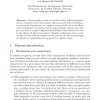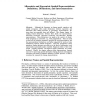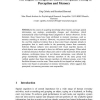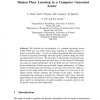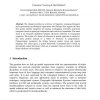SPATIALCOGNITION
1998
Springer
14 years 3 months ago
1998
Springer
Abstract. Virtual reality is used as a novel tool for behavioral experiments on humans. Two environments, Hexatown and Virtual Tubingen, are presented. Experiments on cognitive map...
SPATIALCOGNITION
1998
Springer
14 years 3 months ago
1998
Springer
SPATIALCOGNITION
1998
Springer
14 years 3 months ago
1998
Springer
This chapter gives an overview of our ongoing experimental research in the MeMoSpace project, concerning the cognitive processes underlying human spatial reasoning. Our theoretical...
SPATIALCOGNITION
1998
Springer
14 years 3 months ago
1998
Springer
SPATIALCOGNITION
1998
Springer
14 years 3 months ago
1998
Springer
In the course of acquiring knowledge about layouts and maps spatial information can undergo considerable changes and distortions, which systematically affect knowledge-based judgme...
SPATIALCOGNITION
1998
Springer
14 years 3 months ago
1998
Springer
This paper investigates geometric and ontological aspects of shape concepts underlying the semantics of nouns. Considering the German shape nouns Ecke and Knick (corner and kink) w...
SPATIALCOGNITION
1998
Springer
14 years 3 months ago
1998
Springer
Spatial orientation strongly relies on visual and whole-body information available while moving through space. As virtual environments allow to isolate the contribution of visual i...
SPATIALCOGNITION
1998
Springer
14 years 3 months ago
1998
Springer
We describe the development of a computer-generated arena within which one can study human place learning by asking subjects to locate an invisible target. A series of studies demo...
SPATIALCOGNITION
1998
Springer
14 years 3 months ago
1998
Springer
SPATIALCOGNITION
1998
Springer
14 years 3 months ago
1998
Springer
As Talmy has observed, language schematizes space; language provides a systematic framework to describe space, by selecting certain aspects of a referent scene while neglecting the...
